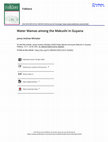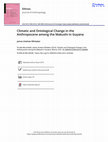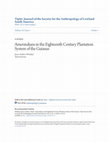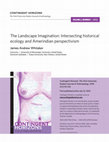Papers by James Andrew Whitaker
Contingent horizons, Dec 31, 1969
Contingent Horizons is an annual open-access student journal informed by an ethos of social justi... more Contingent Horizons is an annual open-access student journal informed by an ethos of social justice. It seeks to expand anthropological discussions by publishing students' outstanding scholarly works, and remaining open to a variety of alternative formats.
Anthropology of Consciousness, Mar 1, 2018

Anthropology & Medicine, 2021
ABSTRACT This paper examines bodily transformation and well-being within the context of a millena... more ABSTRACT This paper examines bodily transformation and well-being within the context of a millenarian movement that emerged during the 1840s in the area surrounding Mount Roraima at the periphery of Brazil, Guyana (British Guiana at the time), and Venezuela. The site of this movement was Beckeranta – meaning ‘Land of the Whites’ – where up to 400 Amerindians were reportedly killed in a quest that is described in its sole historical account as centred around a goal of bodily transformation into white people. In examining this movement, the paper engages with longstanding debates in medical anthropology concerning the body, as well as conversations among Amazonianists concerning the social formation of bodies, and examines sorcery and shamanism as practices that go ‘beyond the body’. Notions of bodily transformation in Amazonia, which are often activated by strong emotions, facilitate conceptual expansions of the body in medical anthropology. The paper suggests that bodily transformations tied to sorcery and shamanism are in some contexts, such as at Beckeranta, associated with desires for well-being. Supplemental data for this article is available online at https://doi.org/10.1080/13648470.2020.1807726.

Social Anthropology, 2020
Strategic alliance and the Plantationocene among the Makushi in Guyana This paper examines how th... more Strategic alliance and the Plantationocene among the Makushi in Guyana This paper examines how the Makushi Amerindians in Guyana use strategies of alliance in dealing with current threats associated with the Anthropocene that are linked to past engagements aimed at resisting slaving raids during the colonial era. The Makushi view logging and mining by outsiders as major sources of deforestation, which they see as a primary cause of ecological and climatic change. In the past and present, they have formed alliances and other relations of partnership with various outsiders-ranging from missionaries to eco-touriststo resist plantation-derived and other extractive predations and excesses. These relations are rooted in shamanic ontologies and are central to Makushi engagements with outsiders during both the colonial and neoliberal eras. Combining ethnographic and ethnohistorical data, this paper will elucidate the past and present contexts of these relations and show how continuities can contribute to further conceptualising the Plantationocene as an alternative framework concerned with understanding the ecological and climatic changes of the Anthropocene. It incorporates the notions of alliance and resistance into the Plantationocene framework.

Folklore, 2020
This article examines folklore concerning water spirits among the Makushi Amerindians in Guyana. ... more This article examines folklore concerning water spirits among the Makushi Amerindians in Guyana. Makushi accounts of spirits called 'water mamas'-twingram or Tuenkaron in Makushi-associate these beings with white people in both past and present. The case is presented here that this folklore reflects Makushi histories and experiences of European contact, colonialism in Dutch and British Guiana, and ongoing relations with Europeans and other outsiders. The themes of abduction, enticement, capricious wealth, and exotic 'palaces' found in stories of water mamas relate to these histories and experiences and inscribe them into the present landscape in Guyana. In addition to describing beliefs in water mamas and examining Makushi histories of interaction with Europeans, the article begins to explore the comparative context of this folklore in relation to other beliefs in water spirits across Amazonia and beyond. The Indians firmly believe in the reality of these mermaids, or 'water-mamas' as they are called in Dutch-Creole; and where they are supposed to have their caves or nests there great danger awaits the traveller. Some are related to be extremely beautiful and possessing long golden hair, like the Lorelei, and whoever casts his eye on them is seized with madness, jumps into the deep water, and never returns. Others are hideous, snakes being twined about them. . .
Anthropology of Consciousness, 2018
This essay considers the role of the imagination in the envisioning and poetic construction of fu... more This essay considers the role of the imagination in the envisioning and poetic construction of future being and becoming in Amazonia. Poetic construction is the process whereby the assembled forms that emerge from the imagination are brought out into the world of the senses. Imaginative envisioning and poetic construction are the means by which diverse ontologies of humans, animals, and spirits are articulated into particular visions of future transformation that posit a becoming from humanity to otherness in Amazonia. This essay seeks to elucidate the conscious processes through which cosmological ideas are imaginatively envisioned and poetically constructed by Amazonian societies as visions of future transformation and becoming from human to nonhuman being.

Ethnos, 2019
This essay examines climatic and ontological change within the Anthropocene among the Makushi in ... more This essay examines climatic and ontological change within the Anthropocene among the Makushi in Guyana. During fieldwork in the Makushi village of Surama, the author was frequently told how the wet and dry seasons have become irregular, the temperature has increased, and ecological changes have occurred in the forests and savannas. These perceived changes impact Makushi subsistence practices and have emerged concurrent with the local development of eco-tourism and increased interactions with outside entities in Surama. The author examines local ontological shifts related to these expanded interactions with outsiders, who advocate concepts of 'climate change', 'sustainability', and 'conservation'. Recent encounters with climate change and outside entities in Guyana provide an ethnographic case of the broader climatic and related changes occurring in Amazonia. This case is analysed herein through an ontological approach. Based on fieldwork data, the author examines how local transformations are situated within the greater dimensions of the Anthropocene.

Ethnos, 2013
time, the researchers involved are very honest about the constraints they encountered trying to b... more time, the researchers involved are very honest about the constraints they encountered trying to balance the interests of institutional supporters with the desire to include local expertise in nonimperialist knowledge production (p. 38). Still, they admit, those problems persisted throughout the project. The team went about their studies of youth very systematically; an entire chapter is devoted to detailing the methodology and is useful for scholars considering embarking on similarly global projects. However, they do not convince the reader that conducting a study in this manner adds as much to the written account of the project as it takes away. Maybe a less systematic approach might have yielded more vibrant details of young people’s lives. We only get fleeting glimpses of how youth actually experience the rich contradictions that define their urban lives through sound-bite quotations or very brief illustrative descriptions. Or perhaps the issue is that it adds too much: the book’s case studies end up demonstrating difference more than similarity across Southern urban youthscapes, in ways that make it less plausible to tie them together thematically. While youth lifestyles in Recife are markedly bifurcated by class difference, the state’s politico-ideological socialization dominates young people’s lives in Hanoi. And in Lusaka, the devastation of SAPs makes young people highly receptive to the apocalyptic discourses of Pentecostal churches. Furthermore, while the chapters in the ‘Youth Making Meaning’ section strive to tie together similarities by talking about themes of home, school, and popular culture, they still come off as more pragmatically arranged around researchers’ interests than actual young people’s concerns in these locales. The arguments of the book thus read as somewhat ad hoc. The book might therefore be better read for its individual regional chapters than for what it as a complete work tells us about youth and globalization. The participants in this project issued themselves quite a challenge in bringing the results of a large study together in a book form. Given the task, they did admirably. But the book is a bit too diverse – in disciplinary, geographical, and analytical scope – to greatly impact the way scholars theorize urban youth. Indeed, separate texts might better provide for this. Yet Hansen, in a cogent conclusion to the book, writes, ‘The type of knowledge. . .that the Youth and the City research project has produced is aimed less at policy formulation than at providing background understanding and context, as well as offering perspectives, drawn from primary observations on the ground, on youth policy as a development priority’ (p. 214). This is how the book might best be interpreted, then: as a starting point for reformulating urban youths’ roles in global economic development. Kristen E. Cheney Erasmus University Rotterdam, The Netherlands # Kristen E. Cheney
Routledge eBooks, Aug 10, 2023
Routledge eBooks, Aug 10, 2023
Despite a slow start, anthropologists in recent decades have contributed foundational studies of ... more Despite a slow start, anthropologists in recent decades have contributed foundational studies of Indigenous encounters with climate change through ethnographic engagements (
Contingent Horizons is an annual open-access student journal informed by an ethos of social justi... more Contingent Horizons is an annual open-access student journal informed by an ethos of social justice. It seeks to expand anthropological discussions by publishing students' outstanding scholarly works, and remaining open to a variety of alternative formats.

Tipití: Journal of the Society for the Anthropology of Lowland South America, 2016
Dutch relations with Amerindian societies in their South American colonies began in the early sev... more Dutch relations with Amerindian societies in their South American colonies began in the early seventeenth century. This contact increased during the eighteenth century, when Amerindians were slaves, slavers, and plantation enforcers for the Dutch. These roles transitioned over time and unevenly extended across the Amerindian societies within the Dutch colonies. The early configuration of the Dutch colonies relied upon Amerindians for trade. With the further development of the Dutch colonies, some societies were repeatedly the targets of slaving while other societies were allied with the Dutch and acted as slavers. Later, with the large-scale introduction of African slaves, some Amerindians became plantation enforcers. Amerindian enforcement of the plantation system was gradually institutionalized during the late eighteenth century. By the nineteenth century, Amerindians had become the integral component in Dutch efforts to prevent uprisings by Africandescent slaves, to pursue runawa...
Tipití: Journal of the Society for the Anthropology of Lowland South America, 2017

Contingent Horizons: The York University Student Journal of Anthropology, 1969
This article considers how the research programmes of historical ecology and Amerindian perspecti... more This article considers how the research programmes of historical ecology and Amerindian perspectivism may be combined and intersected to better describe the cultural understandings, agencies, and intentionalities that underlie the processes of landscape transformation in Amazonia. These research programmes will be discussed and interrelated towards points of contiguity and conjuncture. Historical-ecological research investigates the changing relationships between human beings and their landscapes across time. In particular, it considers historical examples of landscape transformations, which are anthropogenically derived environmental changes. Amerindian-perspectivist research investigates the relationships between human beings and other species within the cosmologies of Amerindian societies in the Amazon and elsewhere. The combination of these currently regnant approaches to ethnographic research among Amerindian societies provides new opportunities to better theorize the cultural ...
Uploads
Papers by James Andrew Whitaker